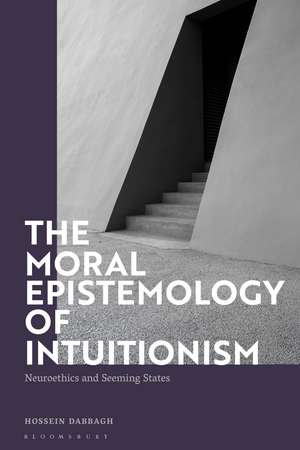The Moral Epistemology of Intuitionism: Neuroethics and Seeming States
Autor Hossein Dabbaghen Limba Engleză Paperback – 26 iun 2024
| Toate formatele și edițiile | Preț | Express |
|---|---|---|
| Paperback (1) | 192.01 lei 6-8 săpt. | |
| Bloomsbury Publishing – 26 iun 2024 | 192.01 lei 6-8 săpt. | |
| Hardback (1) | 511.14 lei 6-8 săpt. | +110.24 lei 4-10 zile |
| Bloomsbury Publishing – 28 dec 2022 | 511.14 lei 6-8 săpt. | +110.24 lei 4-10 zile |
Preț: 192.01 lei
Preț vechi: 249.72 lei
-23% Nou
Puncte Express: 288
Preț estimativ în valută:
36.74€ • 38.46$ • 30.58£
36.74€ • 38.46$ • 30.58£
Carte tipărită la comandă
Livrare economică 31 martie-14 aprilie
Preluare comenzi: 021 569.72.76
Specificații
ISBN-13: 9781350297616
ISBN-10: 1350297615
Pagini: 264
Dimensiuni: 156 x 234 x 25 mm
Greutate: 0.37 kg
Editura: Bloomsbury Publishing
Colecția Bloomsbury Academic
Locul publicării:London, United Kingdom
ISBN-10: 1350297615
Pagini: 264
Dimensiuni: 156 x 234 x 25 mm
Greutate: 0.37 kg
Editura: Bloomsbury Publishing
Colecția Bloomsbury Academic
Locul publicării:London, United Kingdom
Caracteristici
Reevaluates all elements of moral intuitionism with a specific focus on what are called 'seeming states'
Notă biografică
Hossein Dabbagh is Assistant Professor in Applied Ethics at New College of the Humanities, Northeastern University London, UK, and Philosophy Tutor at the University of Oxford's Department for Continuing Education, UK.
Cuprins
Acknowledgements Introduction Part I: Mind 1. Philosophical Intuition's Mental Ontology 2. Moral Intuition's Mental Ontology: Shifting from Philosophical to Moral Intuition 3. The Use of Intuition as Evidence Part II: Epistemology 4. Shaping Classic Moral Intuitionism: An Examination of H. A. Prichard's and W. D. Ross's Ideas 5. Towards the New Moderate Intuitionism: Recent Revivals of Contemporary Moral Intuitionism Part III: Neuroethics 6. Scepticism about Moral Intuition: How My Favoured Account of Intuition Rebuts the Neuroethicists' Position 7. Scepticism about Moral Intuitionism: How My Favoured Account of Epistemological Intuitionism Rebuts Sinnott-Armstrong's PositionAfterwordNotesBibliography Index
Recenzii
How does moral cognition work? And do our moral judgments ever amount to genuine knowledge? In this outstanding book, Hossein Dabbagh answers both questions: along the way, the intuitionist moral epistemology he develops shows how to resist empirically motivated moral skepticism and to vindicate intuitions as the foundation of moral knowledge.
